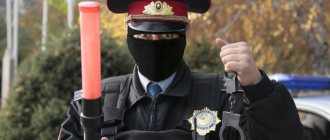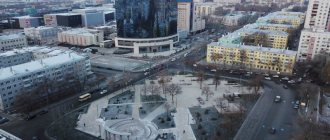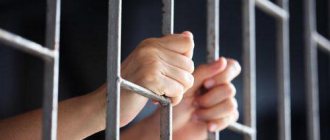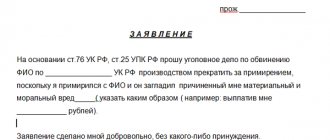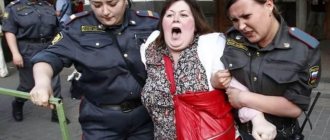A recognizance not to leave may be imposed by a preliminary investigation or court in relation to a suspect or accused of a crime; it is regulated by Article 102 of the Code of Criminal Procedure of the Russian Federation. This preventive measure is chosen only for crimes of minor (up to 3 years) and medium gravity (up to 10 years).
You must understand that the period of being under recognizance not to leave does not count towards the sentence; this only happens with arrest and house arrest.
The essence of a recognizance not to leave is based on three principles. The first principle is the restriction of freedom of movement, the second principle is the obligation to appear immediately when called by the investigator, and the third principle is not to interfere with the investigation.
Restriction of freedom of movement
This lies in the fact that the citizen against whom this preventive measure has been chosen, which means he is clearly already an accused or suspect, must notify of a change in his permanent place of actual residence, even if this happens in the same locality.
If he lived at one address, and then the lease ended or some other circumstances forced him to move in with relatives, then he must immediately notify the investigator about this. Even if he moves to a neighboring street or to another apartment in the same building, otherwise this is a violation.
If a person, under recognizance not to leave the place, wants to travel to another locality, even to the suburbs, he must ask the investigator’s permission about this. That’s right, do not notify that he has left, but ask in advance whether he can leave or not, while informing in detail where he will live in this locality, when he will arrive there, when he will leave there and how long he will be there.
Often it is impossible to take a written undertaking not to leave for the simple reason that the registration address does not coincide with the address of actual residence. This is often a problem because these addresses must match.
Period of restriction of the right of free movement
The period during which the restrictions imposed in connection with the election of a preventive measure are in effect are valid for the period established by the official investigating the case. So this period can last for the following period:
- Carrying out the investigation of the case;
- Carrying out proceedings in the case by the court, that is, before the verdict is passed.
When it comes to a suspect, there are a number of nuances. So, for example, in the case when a preventive measure is chosen for the suspect, he must be charged no later than 10 days from the date of imposition of the movement ban, and in the case when the person is suspected of committing crimes specified in Part 2 of Art. 100 of the Code of Criminal Procedure of the Russian Federation, no later than 45 days. If this requirement is not met, the preventive measure will be cancelled.
Do not interfere with the investigation
Naturally, this includes the obligation not to continue criminal activity, even if you are only suspected of it, perhaps unreasonably and illegally, but nonetheless.
Do not direct the criminal activities of third parties and do not have the opportunity to do so. That is, not to have any suspicious connections in the environment and not to contact them.
If you think that when a preventive measure in the form of a written undertaking not to leave the place is chosen, then operational search activities cannot be carried out against this person - this is a delusion. Very often, the investigator first specifically classifies the suspect’s actions as a crime of moderate gravity, selecting a recognizance not to leave the place as a preventive measure, and assigns operational officers to him so that they conduct surveillance and thereby identify his connections, possible participants and accomplices.
Of course, it is impossible to put pressure on all participants in the investigation or trial, depending on what stage. This includes the investigator and operational officers, witnesses and victims, experts and their loved ones, acquaintances and relatives.
While you are under recognizance not to leave, you should not communicate with this group of people at all, except when called by the investigator and in his office; all this can be regarded as a violation of the procedure for being under recognizance not to leave.
Naturally, it is better not to commit even administrative offenses and not to be held administratively liable; this can also be regarded by the investigation as a formal basis for changing the preventive measure to a more stringent one.
In what cases can the investigator cancel the recognizance not to leave and put him under arrest?
Read this carefully. and everything will become clear... if you don’t want to go to jail.
Article 102. Undertaking not to leave and proper behavior
A written undertaking not to leave the place and proper behavior consists of a written undertaking by the suspect or accused:
1) not leave your permanent or temporary place of residence without the permission of the inquiry officer, investigator or court;
(
2) to appear at the appointed time when summoned by the inquiry officer, investigator and to court;
3) not interfere with the criminal proceedings in any other way.
Commentary on Article 102
1. A preventive measure - a written undertaking not to leave and proper behavior conditionally consists of two parts. Actually, a written undertaking not to leave is intended to ensure that the accused (suspect) does not evade the interrogating officer, investigator, prosecutor and the court. This means that the accused (suspect) cannot leave his permanent or temporary place of residence without the permission of the specified officials and bodies.
2. In accordance with the Law on the Right of Citizens to Freedom of Movement, every citizen has the right to freedom of movement, choice of place of stay and residence within the Russian Federation.
3. Article of the Law on the right of citizens to freedom of movement introduces the concepts of “place of stay” and “place of residence”.
Place of residence - a hotel, sanatorium, holiday home, boarding house, camping, tourist center, hospital, other similar institution, as well as residential premises that are not the citizen’s place of residence, in which he resides temporarily.
Place of residence - a residential building, apartment, office, residential premises, specialized houses (dormitory, hotel-shelter, house of maneuverable fund, special home for the elderly, boarding house for the disabled, veterans, etc.), as well as other residential premises, in in which a citizen permanently and primarily resides as the owner under a lease (sublease), lease agreement or on other grounds provided for by the legislation of the Russian Federation.
4. In accordance with Art. 3 of this Law introduced registration of citizens of the Russian Federation at the place of stay and place of residence within the Russian Federation.
5. The accused (suspect) must notify the inquirer, investigator, prosecutor and the court of a change of place of residence within the same locality.
6. Proper behavior of the accused (suspect) presupposes the achievement of those goals with which the legislator associates the use of a preventive measure.
The accused (suspect) must not hide and must appear at the appointed time when summoned by the inquirer, investigator, prosecutor and to court.
7. A recognizance not to leave the place and proper behavior can also be used to eliminate the possibility of obstructing criminal proceedings or committing a new crime (for example, the likelihood of influencing witnesses, the victim, the destruction of material evidence not located in the location of the accused (suspect), or the possibility continue criminal activities associated with traveling outside the place of residence).
The peculiarity is that its implementation for these purposes is associated with the need to be at the place of residence or place of stay.
8. To ensure the execution of the sentence, a recognizance not to leave the place and proper behavior is chosen, as a rule, if the penalty is not related to imprisonment.
9. The undertaking not to leave and proper behavior (Appendix 97 to Article 476 of the Code of Criminal Procedure) indicates: the place of preparation; day month Year; last name, first name, patronymic of the accused (suspect), residential address; qualification of the crime; who is given a subscription not to leave the place of stay or residence without permission, to appear when called and not to interfere with the proceedings. It is clarified that violation of the undertaken obligations may result in the application of a more severe preventive measure. The signature of the accused (suspect) and the official who took the signature is affixed.
10. The procedural procedure for applying a ban on leaving the place and proper behavior consists of issuing a resolution (definition), announcing it to the accused (suspect); explanations of the procedure for appealing the application of a preventive measure; delivery of a copy of the resolution (definition); taking away a written undertaking not to leave and proper behavior.
Call WhatsApp
Did the answer help you? Yes No
Who cannot be given a written undertaking not to leave the place
It is impossible to choose such a preventive measure for those citizens who are suspected or accused of committing grave and especially grave crimes.
Those citizens whose professional activities involve frequent business trips and travel, for example, truck drivers and conductors, and those citizens who, due to the nature of their activities, often travel abroad.
You cannot issue it to a witness while you have the status of a witness; there cannot be any written undertaking not to leave the place, because this is still a preventive measure that is chosen only in relation to accused and suspects. However, in relation to witnesses and victims, Article 112 of the Code of Criminal Procedure of the Russian Federation allows for an obligation to appear, when they undertake to appear at the appointed time at the appointed place. This is usually done in order to discipline such people if they do not live in this region.
The document from the investigator can be shown at work, and you will be required to be released, and this day will not be counted as absenteeism, but will be paid.
Threats as a basis for issuing a subscription
Undertaking not to leave the place - do not violate it!
There are cases in which there is a possibility that the suspect (accused) may threaten or commit illegal actions against persons appearing as witnesses in the investigative case. In such cases, a restriction in the form of issuing a subscription is also used.
Thus, in this case, such a document will act as a guarantee that the suspect (accused) will not interfere with the investigation. In reality, of course, a citizen who has committed a serious criminal act will not be stopped by a written undertaking not to leave the place and he will try to interfere with the investigation, sometimes not even on his own, but through his accomplices. Unfortunately, such actions can be very difficult to detect.
Accordingly, the document itself cannot guarantee full 100% fulfillment of the specified conditions, therefore, in certain cases, instead of issuing it, more serious measures are prescribed, such as arrest for the period of investigation and trial.
Terms of recognizance not to leave
If you are a suspect, then a written undertaking not to leave can only be assigned for 10 days. After 10 days, you must either be charged and choose a preventive measure, perhaps it will remain the same, or completely drop all charges against you and cancel your recognizance.
In general, a recognizance not to leave is chosen for the duration of the investigation or for the duration of the trial. The recognizance not to leave the place does not indicate the period, but all officials involved in the investigation of the criminal case understand that the recognizance not to leave is chosen for the entire period of the investigation, and every time the investigation period is extended, the recognizance not to leave is automatically extended.
An alternative to a recognizance not to leave is a personal guarantee to appear, when the citizen himself, instead of being given a recognizance not to leave, gives a guarantee that he will definitely appear. For violations, approximately the same sanctions are provided, that is, the automatic selection of a more stringent preventive measure.
Who has the authority to appoint and issue
Now it is necessary to determine which authority has the authority to appoint and issue a recognizance order. In accordance with the legislation of the Russian Federation, certain bodies have such powers, which in a particular case are authorized to choose preventive measures during the investigation process.
This could be the investigative bodies or the court. Under certain circumstances, traffic police officers may issue a citizen a written undertaking not to leave (in cases with citizens who have arrears of alimony). If we consider police officers, they have the authority to issue such a document only in some cases.
Thus, it is necessary to understand that there is a limited circle of officials who have the right to legally issue a recognizance not to leave.
Consequences for violating the subscription
Article number 110 of the Criminal Procedure Code of the Russian Federation states that a person who violates the requirements may be taken into custody or house arrest. The period of such measures will be similar to the original measure. And it will cease to operate when the investigative process ends.
If during the investigation it turns out that a person has disappeared or left his place of residence, he will be put on a criminal wanted list. Once he is caught, he will be taken into custody and could face jail time.
If a person violated the conditions intentionally, then upon returning back he needs to appear at the police department and repent of his offense.
Lawful violation of requirements
Does a person with mobility restrictions have the right to move to another locality?
No. But if such circumstances arise, he must submit a petition to the appropriate authority. The request must include the following information:
- Specific dates of absence.
- Grounds for leaving your place of residence.
- Facts confirming the legality of forced departure.
Then a decision will be made. If it is positive, then the citizen will be able to leave for another city, but upon arrival he must register at the police station. If this is not done, then such actions can be considered an attempt to escape.
Here you can also ask for another preventive measure, for example, to appear on demand. In this case, he has the right to visit other cities and leave the country without restrictions.
This is important to know: Search by enforcement proceedings
How to cancel a decision early?
If a citizen has compelling reasons and evidence, then the recognizance not to leave the place can be replaced with another preventive measure. Such a decision can only be made by the leadership of the investigation or the court.
A positive decision can be made in the following cases:
- If during the investigation it turns out that the person is not guilty of the committed act.
- If the citizen does not need to be constantly monitored.
The decision made is issued in two copies. One remains with the citizen. You should not immediately get rid of the document, since the resolution does not immediately reach the relevant authorities. The presence of the act will prove that you are right in case of misunderstandings.
We found out and received answers to the most important questions regarding such a document as a written undertaking not to leave. In all difficult situations, it is advisable to contact competent lawyers. They will specifically analyze your case and draw up an action plan to solve the problem.
What if the conditions were violated?
There are situations when a citizen may violate the conditions and requirements presented in the subscription. Then he needs to report to law enforcement agencies as soon as possible and inform the prosecutor or investigator about this. This will significantly reduce the punishment. If it turns out that a person was forced to leave his place of residence and he has evidence, then the preventive measure may not be applied at all.
Expert opinion
Kostenko Tamara Pavlovna
Lawyer with 10 years of experience. Author of numerous articles, teacher of Law
In any case, you must immediately report all your actions to the leadership of the investigation. If you urgently need to leave your place of residence, then, as a rule, there are no problems with this. Law enforcement agencies are trying to accommodate and issue exit permits.
How to change the preventive measure to subscription
To submit a petition to change the preventive measure to a written undertaking not to leave the place, it is required that there be one of the following grounds under the Code of Criminal Procedure of the Russian Federation:
- If a measure was chosen in the form of detention, but the legal period for detention there has expired, however, suspicions remain that the citizen may be a criminal.
- Circumstances of the case have been identified that no longer allow the previously prescribed measure to be applied (for example, the classification of the crime has been changed).
Sample application
In order to change one measure to another, you need to file a petition. This is a document drawn up in the name of the investigator. Its structure is typical for all statements.
It must contain the following information:
- on behalf of whom the document is drawn up (the citizen himself or his lawyer);
- information about the citizen;
- case data;
- what measure was chosen and why;
- reasons for replacing it with another;
- the presence of mitigating circumstances;
- request to replace it with a written undertaking not to leave;
- signature of the originator and date of execution of the document.
Issuing algorithm
Let's look at the stages of issuing such a restriction:
- A decision is made not to leave a particular person.
- The document itself is drawn up. It will necessarily indicate the type of crime and the reasons why the person’s freedom of movement is limited.
- The decision made is announced to the person.
- The entire text of the document is explained to the person in detail. If this is not done, the suspect or accused may refuse to sign it.
- The person is explained the instructions for challenging the adopted decision.
- Signing the document. If the suspect or accused is a child under 18 years of age, he must do this in the presence of his parents or guardians.
If a person refuses to sign the act, then a more serious preventive measure may be taken against him.
This is important to know: How to calculate overpayment on a loan
